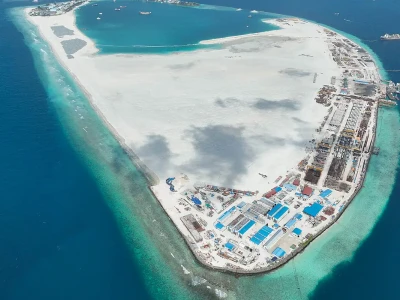
Court hears Ameenee Magu tree motion; ruling on Sunday
While the Male streetscaping project has been heavily criticised by the public, the President's Office had defended the removal of trees.
Top Stories
By
Shahudha Mohamed
Civil Court on Thursday held the first hearing of the case filed by Speaker Mohamed Nasheed seeking a temporary order to stop the removal of matured, shady trees on both sides of Ameenee Magu for road construction.
After listening to both Nasheed’s appeal and Road Development Corporation (RDC), the contractor's response, Judge Mariyam Waheed said that a decision on the case will be made on Sunday.
Former president Nasheed, who leads the ruling Maldivian Democratic Party (MDP), had filed the case with the court after having called upon the contractors and relevant authorities to think again about the removal of trees amid public uproar caused by the tree removal.
The case was filed by Shunana&Co LLP on behalf of Nasheed, and the lawsuit requests a court order to immediately halt the removal of trees until a verdict has been reached.
On behalf of the speaker, his attorney presented at court:
-
Environmental Impact Assessment (EIA) report for Ameenee Magu redevelopment project advised block paving instead of asphalt paving.
-
Block paving will not require any trees to be removed.
-
The EIA report on the project is incomplete; no data on how tree removal can increase pollution, and as a result contribute to climate change, endanger public health and damage control strategies.
-
The EIA had advised to not remove any trees unless there is no other choice, and the removal of these trees will contribute directly and detrimental to the environment.
After presenting the case, Nasheed's attorneys requested the court:
-
To uphold that RDC’s work violates Maldivian laws and regulations as well as international conventions signed by the country.
-
To consult with licensed technical experts and relevant authorities to determine if the tree removal is being done without any alternatives to the issue.
-
To issue a temporary order to halt tree removal unless it is established by experts that there is no other alternative.
On Nasheed's behalf, lawyer Mariyam Shunana told the court that if the judge does not issue a temporary order to stop the tree removal, it is equivalent to the court having endorsed the removal.
She went on to elaborate how the combined effects of tree removals and poured asphalt on Ameenee Magu can lead to harmful effects upon the environment. She underlined the 'urban heat island effect’, and how it would worsen with the tree removal by causing an increase in road temperatures, increased air pollution in Male, which would ultimately lead to adversely affecting people's respiratory functions, collecting the overall impact of environmental threats caused by the project.
Cutting down trees on Ameenee Magu will cause "irreparable damage", she said.
Responding to Shunana's allegations, defence lawyers representing RDC and the planning ministry said the damages caused by the project will be “repairable”.
The defendants said:
-
After removing the low hanging trees, young trees will be planted in their place, so that the new trees will benefit soon.
-
Overall benefits from the road development will be far more than any damage caused.
-
The EIA was prepared in accordance with the law and regulations to minimise the damages caused.
-
The trees on Ameenee Magu are being removed without an alternate course; the removed trees can be planted in schools and parks within Male.
-
The trees were cut down by branches so the branches may be replanted. Since the trees are so mature and big, uprooting and transporting it will be too difficult.
-
RDC will suffer a loss of over MVR 100,000 per day if the project is halted.
The prosecution presented the EIA report, relevant research data, case study of a similar judicial case conducted in India and other evidence. Shunana also said that environmental experts would be brought as witnesses for the upcoming hearings.
The defence evidence:
-
EIA Report
-
Pictures showing the damage caused to the underground cables and pipelines buried in the streets of Ameenee Magu by invasive tree roots.
-
An op-ed published in Dhauru news by the Director General at the environment ministry Mohamed Zahir
-
Other evidence
Judge Mariyam Waheed decided to hold a second hearing of the case on Sunday. During the hearing, a decision on the temporary order to prevent deforestation will be made, said the judge.
While the Male streetscaping project has been heavily criticised by the public, the President's Office had defended the construction of Ameenee Magu, saying that even though "no one wants to cut down trees", the trees on Ameenee Magu needs to be removed because of the damage their invasive roots cause to the underground network of cables and pipelines.




